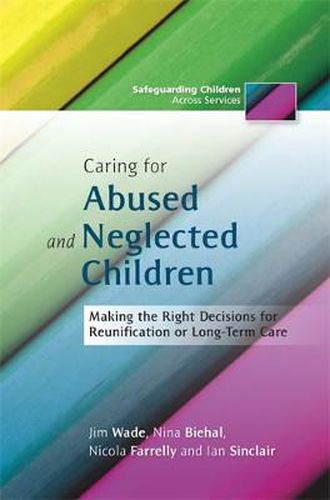Readings Newsletter
Become a Readings Member to make your shopping experience even easier.
Sign in or sign up for free!
You’re not far away from qualifying for FREE standard shipping within Australia
You’ve qualified for FREE standard shipping within Australia
The cart is loading…






The decision whether or not to reunify a child in care with their birth family is one of the most serious taken by children’s services, and often involves considerable risk.
This book examines the long-term consequences of this decision for children who entered public care for abuse or neglect. It compares the experiences and progress of children who remained in care or returned to their birth families up to four years after the decision was taken. It covers how the decision is made, the factors taken into account when making it and provides important suggestions for effective decision-making. It compares the progress made by the children in relation to their safety, stability and emotional well-being. The book demonstrates that, contrary to common belief, long-term care can be a positive option for maltreated children.
This book provides important messages for reunification policy and practice in relation to maltreated children. It will be essential reading for social work practitioners, researchers and policy makers.
$9.00 standard shipping within Australia
FREE standard shipping within Australia for orders over $100.00
Express & International shipping calculated at checkout
The decision whether or not to reunify a child in care with their birth family is one of the most serious taken by children’s services, and often involves considerable risk.
This book examines the long-term consequences of this decision for children who entered public care for abuse or neglect. It compares the experiences and progress of children who remained in care or returned to their birth families up to four years after the decision was taken. It covers how the decision is made, the factors taken into account when making it and provides important suggestions for effective decision-making. It compares the progress made by the children in relation to their safety, stability and emotional well-being. The book demonstrates that, contrary to common belief, long-term care can be a positive option for maltreated children.
This book provides important messages for reunification policy and practice in relation to maltreated children. It will be essential reading for social work practitioners, researchers and policy makers.